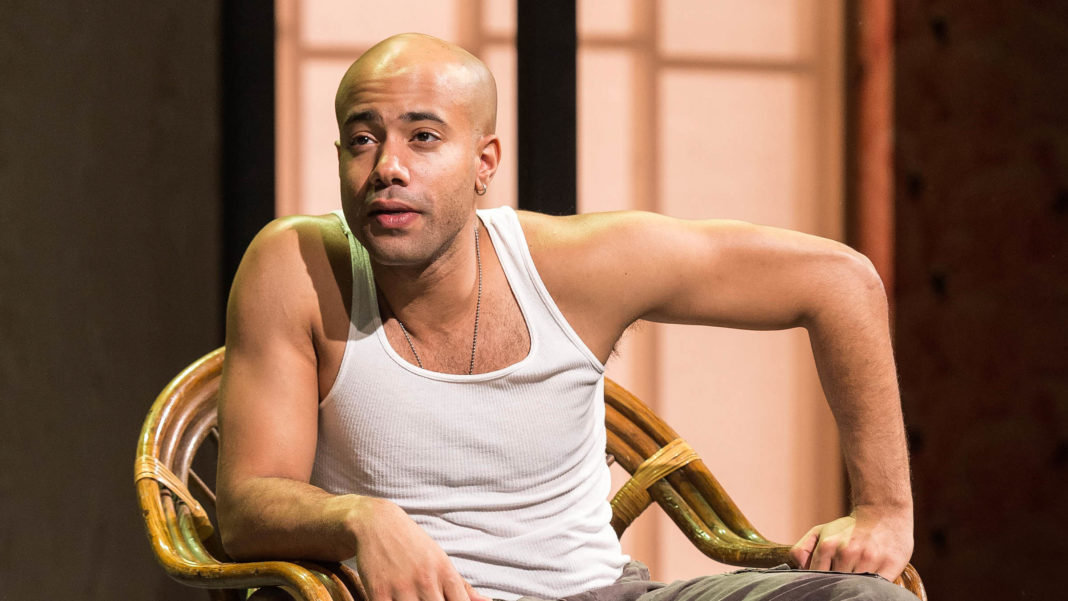This is the second in a trio of interviews with each actor who plays “Elliot” in the trilogy of plays by Pulitzer Prize-winning playwright Quiara Alegría Hudes. This interview is with Sean Carvajal who plays Elliot in Water by the Spoonful, which continues through March 11th at the Mark Taper Forum. Hudes was inspired to write this trilogy based on the experiences her cousin, Elliot Ruiz, had serving in Iraq.

This isn’t your first experience with Water by the Spoonful. [He previously played the same part in a 2016 production.] How has your perception of Elliot’s journey in the play evolved since you first tackled the role?
I was too young to understand this thematic chord that the fruit doesn’t fall far from the tree. Elliot’s journey is similar to mine. I was taking to Elliot Ruiz about that time and just like him, we were so muddled and blinded by anger. It wasn’t something we could reflect on. Now because of time and my own healing, it’s interesting to go back and visit this role. Particularly his relationship with his mother and his relationship with his addiction, his desire to change and become a man and let go of all the things that hold him back.

How similar were your own experiences?
In my journey it’s coming to terms with my parents. They did the best they could and the best they knew how. Issues with abandonment; feeling that your parents chose something over you. I spent a lot of my 20s trying to find ways to mask that pain and push that aside without allowing myself to understand that. Addiction, that’s what I was dealing with trying to run away from the pain.
Playwright Quiara Alegría Hudes has referred to her cousin Elliot as being like Will Smith’s Fresh Prince of BelAir. But post-Iraq she saw a pain in his eyes that wasn’t previously there. Is that how you see him?
Totally. There’s this great scene that Will Smith has, one of his best performances, but it speaks volumes to who he was. It was a scene with his father. You watch stories like Elliot and The Fresh Prince of Bel-Air and they have all this humor and lightness. But deep down inside they are hurting. They mask it.
When you meet Elliot Ruiz, you’d never think he carries this with him because he’s so good at masking it – he knows how to endure war. But deep down he’s still carrying it. At the opening night party he was talking about his mom, his journey of forgiving her and bringing her back into his life. You can see it was still a work in progress.
Isn’t that an awful concept? The idea of “enduring war?” [Note: There is a spoiler in the answer. Please skip if you don’t want to know part of what happens in the play.]
But it’s something he’s learned how to cope with. He has this courage. He learned how to move forward despite this pain. In the play, being a part of his sister dying and the mother not helping because she was getting high…that’s war. That’s something he should never have had to do. That survival tactic was so preconditioned with him before he left for Iraq. It’s still tragic he has to do that.
How much do the two plays that sandwich this one help inform the arc of this character for you?
When you play a character in a play, you understand him only in that present moment. Because there’s a trilogy you get to follow his arc, where he came from and who he becomes. It’s dope. It was tricky because I didn’t want to pay too much attention to the other storylines. The first play was important to understand the idea of what kind of man he wanted to become. The final play I only read bits and pieces because I didn’t want it to influence me too much for the Elliot I was developing.

In the play, Yazmin talks about the role of dissonance in John Coltrane’s music. What role does dissonance play in your life?
Life is messy. Life is loud. Life is chaotic. Like dissonance you can hear one chord and another that’s so sharp, but that’s what life is. You have pretty notes and then ugly notes. What I’m learning is that in itself is music. No matter how chaotic the sound may be, it’s life and you have to make peace with it. That’s your song and that’s what you carry on for the rest of your life. You have to come to peace with the song that is yours.
To see Part 1 of this series, please go here.
Photo Credit: Craig Schwartz











